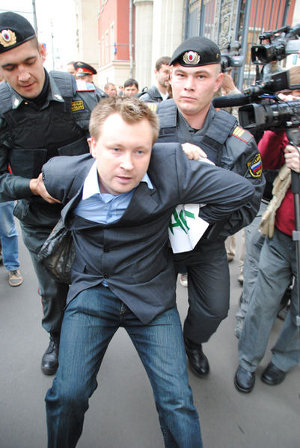 Last month the European Court of Human Rights ruled that Russia must pay damages for refusing to allow ‘pride parades’ to be held in Moscow. Richard Mole argues that Russian anti-LGBT legislation is having a counter-productive effect by mobilising activists both within the country and beyond Russia’s borders. Despite this international pressure, Russian authorities have so far shown little sign of backing down.
Last month the European Court of Human Rights ruled that Russia must pay damages for refusing to allow ‘pride parades’ to be held in Moscow. Richard Mole argues that Russian anti-LGBT legislation is having a counter-productive effect by mobilising activists both within the country and beyond Russia’s borders. Despite this international pressure, Russian authorities have so far shown little sign of backing down.
Almost 20 years after it was decriminalised, homosexuality in Russia is coming under renewed attack. In March St Petersburg became the fourth Russian city to adopt legislation banning ‘homosexual propaganda’. While commentators argued that the vagueness of the law, which bans ‘public action aimed at propagandising sodomy, lesbianism, bisexualism and transgenderism among minors’, would make it difficult to bring successful prosecutions against transgressors, LGBT rights activist Nikolay Alexeyev was convicted in May for breaching the law by picketing St Petersburg City Hall with a banner, which read ‘Homosexuality is not a perversion’.

Alexeyev’s insistence that there were no minors present at the City Hall can be taken as proof, if proof were needed, that the law was not motivated by a desire to protect Russian children or Russian society, but is simply the latest in a series of legislative measures used by the state to intimidate political opponents and generate an atmosphere of legal disquiet. Were activists to go ahead and hold meetings or rallies which were subsequently attacked, police could use the law to justify not intervening to protect activists, as the events could be deemed ‘homosexual propaganda’ – a criminal offence.
While the threat of prosecution and violence should not be underestimated, a more damaging consequence of the law for LGBT individuals in Russia is the association of homosexuality with criminality. Activists’ ability to convince the general population that LGBT individuals deserve equal rights is seriously undermined if they are viewed as criminals. The law thus seeks to silence anyone attempting to counter a political discourse in which homosexuals are depicted as social deviants, paedophiles, or mentally ill, and grants homophobes an exclusive voice and moral leadership in public debates about sexuality.
It has been suggested that the Russian state is seeking through legislation to force gays and lesbians back into the closet and make homosexuality invisible, as it was in the USSR. However, the situation is far from being as desperate as it was during the Soviet period. For one thing, an experienced LGBT rights movement does exist in Russia. While, for many years, gays and lesbians in Russia were criticised by activists for their political apathy, anti-gay laws have lit a fire under many sexual dissidents. The top-down pressure from the state has produced bottom-up counter-pressure in the form of a wave of new (or renewed) LGBT activism.
The law has also brought LGBT rights in Russia – a topic which the authorities sought to suppress – to national and international attention. The law triggered a media frenzy and has been the subject of lively debates on television, in which activists have been able to make their case for greater equality. The visibility the legislation has inadvertently produced can be seen as an important component of resistance to the state-sponsored attempts to make homosexuality invisible.
Russian activists can now count on the support of LGBT movements elsewhere in Europe. While the advice of certain ‘indigenous’ LGBT organisations in Western Europe has been criticised for being somewhat patronising and thus not always welcome, activists in Russia can also now draw on the support of Russian ‘gay diasporas’ overseas. Russian LGBT migrants in Berlin, many of whom live transnational lives between Germany and Russia, have been active in raising awareness of the situation in their homeland and putting pressure on the German government to act.
So far, however, international pressure is having little impact on Russia. Last month, for the first time, a Council of Europe conference of ministers ended without a declaration being adopted, due to Russia’s opposition to an item referring to the requirement to combat discrimination and violation of the rights of LGBT youth. Moreover, the Russian authorities still refuse to allow a Pride parade to go ahead in Moscow, despite the judgement against them by the European Court of Human Rights. While the majority of Russian citizens may feel that anti-gay legislation does not affect them, they should nevertheless be concerned at the increased use of the law as an instrument of state power.
This article first appeared at the UCL SSEES Research Blog.
Please read our comments policy before commenting.
Note: This article gives the views of the author, and not the position of EUROPP – European Politics and Policy, nor of the London School of Economics.
Shortened URL for this post: http://bit.ly/RuLGBT
_________________________________
 Richard Mole – University College London
Richard Mole – University College London
Richard Mole is a Senior Lecturer in Political Sociology at UCL-SSEES (School of Slavonic and East European Studies). His research focuses on the relationship between identity and power, with particular reference to political legitimacy, social citizenship, gender and sexuality.


